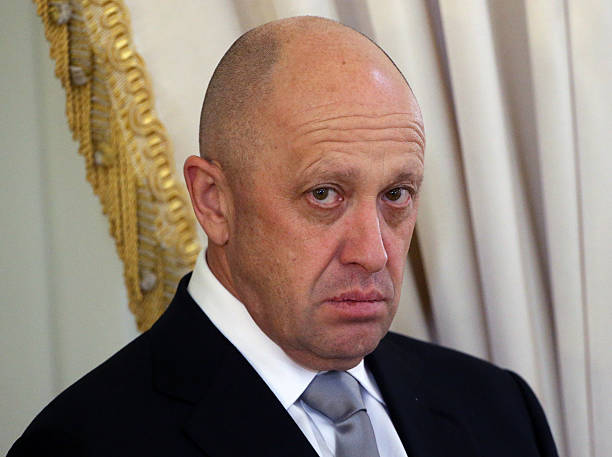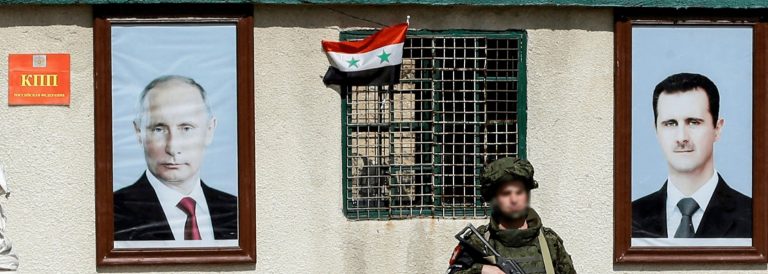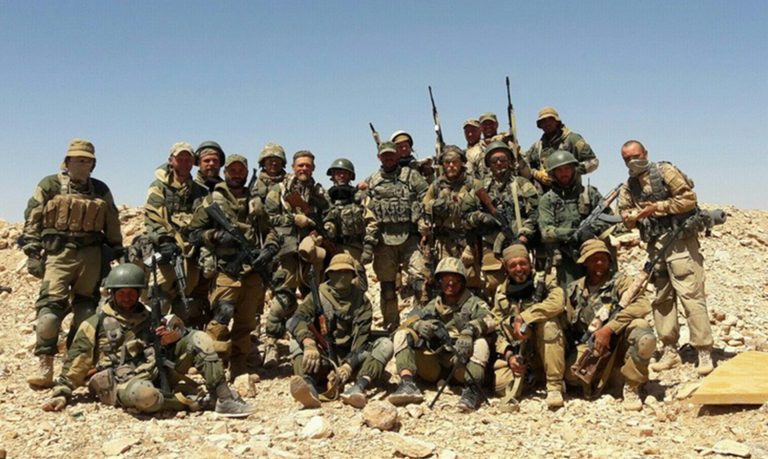CAR: how Russian political technologies brought the country to a new civil war
MBK – Roman Popkov – January 14, 2021
When Russian mercenaries, businessmen and political technologists came to the Central African Republic three years ago, the local population looked at them with hope. After three years of Russian “effective management,” the CAR is engulfed in a new war, with rebels trampling Russian flags.
The soil is reddish in color, typical of Central Africa. Savanna. Rural houses. The correspondent of the TV channel “Russia 1” excitedly taratorit, tells about the successes of Russian “specialists” liberating villages from the rebels. Two white men in camouflage, with machine guns, in Russian, declare in front of the camera that during the liberation of the villages “there are no dead and wounded among the civilian population.” One of the fighters has a stripe with the runes Soul, Teivaz and Turisaz on his bag. Runes are a popular element of the symbolism of the far-right subculture. However, chevrons with them are also popular among employees of Russian law enforcement agencies.
“Contractors”, “instructors” – this is how the pro-government media delicately call the mercenaries “Wagner PMC”, who have been in the CAR for three years. It’s a tough time for the Wagnerians. The presidential election, in which Russian political strategists wanted to organize a quick victory for incumbent President Faustin-Archange Touadera, resulted in a new civil war. At the airport of the capital Bangui, Russian military transport planes land – bringing fresh people and equipment. Without reinforcements, the Central African Republic will be difficult to hold.
Ambitious project to “export security”
The Central African Republic occupies an important place in the geopolitical plans of the Kremlin and businessmen close to it. About the penetration of military and commercial structures into the CAR, probably controlled by Yevgeny Prigozhin, the world media have been writing for more than a year. At the same time, Prigozhin himself constantly denies his connection with the Wagner PMC and with other companies operating in Africa. The entrepreneur claims that he “had no business interests in the CAR.”
In 2018-2020, it was believed that the tactics of “soft power”, a combination of economic, military, political and diplomatic directions of work in the CAR gave their fruits.
The company Lobaye Invest ( according to the Dossier Center, close to Prigozhin), was engaged in the extraction of gold and diamonds in the CAR. The company was registered in this country by Yevgeny Khodotov, presumably an employee of Prigozhin.
Wagner PMC fighters stationed in the CAR trained the army of the local government, turning it from a poor gang into a relatively combat-ready force. In the fall of 2017, sewa Security Services was registered in the republic, presumably a legal entity for Russian mercenaries. President Touadera, friendly to Moscow, was guarded by the same mercenaries. Presidential security issues were fully managed by Valery Zakharov (according to the Dossier Center, he had a personal number M-5658 in the Wagner PMC). In fact, Zakharov became one of the most influential people in the CAR.
Russian political strategists working for Prigozhin’s alleged structures – Dmitry Sytyi, Yevgeny Kopot and others – worked tirelessly to stabilize the regime of the current president. In the CAR, a radio station “Lengo Songo” was opened, which means “Building Solidarity” in the local sango language. The radio station glorifies the Russian-Central African friendship. On the streets of the cities of the CAR you can see billboards with the propaganda of military cooperation with the Russian Federation. In the capital, Bangui, they began to hold magnificent beauty contests, which, according to some reports, were sponsored by Lobaye Invest. The winner of the contest “Miss Central Africa” was awarded the crown of “Miss Russia-2013” specially brought to the CAR, and the crown of “Miss Bangui” was personally presented by the presidential security adviser Valery Zakharov.
In addition, the alleged “Prigozhintsy” began to engage in their favorite, well-known business in the CAR – to create armies of trolls in social networks. To be fair, their rivals in the struggle for influence in the CAR, the French, also resorted to the help of troll factories. Later, the social network had to search for and delete fake Russian and French accounts.
But it cannot be said that the friendliness of the inhabitants of the republic towards Russia was playful, and was ensured only by political and technological fraud and mercenary bayonets. In the CAR, ordinary people at first were really sympathetic to the arrival of Russians. There was extreme fatigue from years of civil war and irritation over France, which, according to local residents, was unable to stabilize the situation in its former colony. The arrival of the Russians inspired hope for security and a reset of the entire domestic political life.
Indeed, at first, Russia’s diplomatic efforts seemed to bear fruit. In 2018, the Russians managed to bring to the negotiating table in the Sudanese capital khartoum the field commanders of the warring groups – the Christian “Anti-Balaka” and the Muslim “Seleka” (or rather, a conglomerate of armed formations that arose on the site of the disintegrated group). They agreed to create a common platform for consultations and actions to establish peace in the country. The ANF news website controlled by Prigozhin immediately called the Khartoum Accords “a lasting peace in the CAR” – although in an interview with the same site, field commander Abdullah Isen said that he considered the Khartoum meeting not a full-fledged negotiation, but only a first step towards them.
And yet in Central Africa, for the first time in many years, there is at least some hope for peace, for salvation from the bloody swamp of the “failed state”, that is, a “failed state”.
The Russians were also interested in friendly ties with the leaders of Muslim rebel groups also because it was the formations of the former “Seleka” that controlled a number of mineral deposits important for Lobaye Invest, in particular, diamond mines near the city of Bria.
The situation for Moscow was quite favorable: a friendly leader reigns in Bangui, whose power structures are entirely dependent on Russian support. The Central African opposition (including the armed one) was also generally loyal to the Russians. The CAR could hypothetically become a bridge connecting Russian spheres of influence in Sudan (where the Russian Federation was already actively working) and in the Democratic Republic of the Congo (there in 2018 it was only necessary to work seriously).
Most importantly, overcoming the protracted crisis in the CAR could be a successful case for Putin’s Russia, which dreamed of becoming a “security exporter.” The Kremlin then wanted a revival of the expansionist successes of the Soviet Union during the Cold War. But today’s Russia, unlike the USSR, has neither Soviet economic resources nor an ideology suitable for export. Therefore, the main commodity from such a Russia for the CAR was to be nimble political strategists-fraudsters and armed men with small (by the standards of real, Western private military companies) salaries.
The rosy picture was spoiled by only one bloody and shameful story. In July 2018, three Russian journalists were killed in the CAR – Orkhan Dzhemal, Kirill Radchenko and Alexander Rastorguev. They came to shoot a documentary about the activities of structures associated with Prigozhin and were shot on a night road near the city of Sibut.
Investigators from the Dossier Center were able to establish in detail many of the circumstances of this crime. It became known that Russian journalists in the CAR were monitored by representatives of local law enforcement agencies who were in constant contact with the operatives of the Wagner PMC. It was established that the UN staff member named Martin, who was visited by journalists, did not exist, and kirill Romanovsky, an employee of the FAN website who provided contact for this “Martin”, according to the authors of the investigation, actually participated in luring journalists into a trap. It became known that immediately after the murder of journalists, political technologists who worked in the CAR began to invent versions of “alien gangs” allegedly guilty of this crime.
However, these and many other data of the investigation of the Dossier Center were completely ignored by the Russian investigative authorities. The structures involved in the murder of journalists continued to build their nest in the CAR.
Export of Russian practices and “the fall in the rating of the Russian presence”
And now, three years after the arrival of Russian mercenaries and political strategists in the CAR, in 2021, this country is again engulfed in the flames of a full-scale civil war. We can talk about the failure of a three-year project to stabilize the situation. In the run-up to December’s presidential election, military-political factions tore up the Khartoum Agreement, of which Russians were so proud, and, in effect, declared war on the Russian-backed government. At the same time, the official Bangui removed from the elections Francois Bozizé, an authoritative (and quite friendly to Moscow) politician who held the post of head of state in 2003-2013, and now became a rival of Touadera. Calls by opposition parties to postpone the presidential elections due to the outbreak of hostilities and the inability to protect the vote from fraud were not heeded by the current president.
The reason for such a sharp plunge of the country back into chaos is the inability of Russian “political consultants” to abandon the traditions of “managing the political process” inherent in the Russian Federation. The policy of irremovability of power, the removal of the strongest opposition candidates from the elections under far-fetched pretexts, the approval of voluntaristic methods of governing the country – this is what in reality turned out to be Russia’s export commodity. In addition, under the current head of state, they also began to create a “party of power”, consisting of unscrupulous careerists. Guests from Moscow and St. Petersburg simply did not want to take due account of the complex ethno-religious situation in the country, to understand and respect the fragile balance of power in the republic.
The collapse of the Russian “political and technological support” of the political life of the CAR is being talked about in chorus even in the community of pro-Kremlin specialists on Africa. “Zeroing out the results of Russia’s unique military-political peacekeeping mission in the region”, “falling rating of the Russian presence” – in such terms Africanists describe their attitude to what is happening.
The “rating of the Russian presence” really fell below nowhere else. Moderate opposition forces criticize this “presence,” and rebel groups trample on Russian flags that have fallen into their hands.
The Coalition of Patriots for Change, created by the rebels, is fighting very vigorously. This association against the president and his Russian patrons included Christian detachments “Anti-Balaki” and Muslim groups of the former “Seleka” – for the CAR this is just an out of the ordinary phenomenon.
One of the first hotbeds of the uprising was the province of Lobai in the southwestern part of the country, previously considered relatively calm. It is there that the main deposits of minerals are located, of interest to the company Lobaye Invest created by the Russians. At the same time, the rebels began to attack the capital from the north and north-west, under their attacks were also a number of cities in different parts of the country. For a while, rebel groups managed to occupy the second largest city of the CAR, Bambari, and a number of other cities. The rebels also managed to capture at least one BRDM-2 armored vehicle from among the military equipment recently delivered to the CAR from the Russian Federation.
A government army, armed and trained by the Russians, would hardly have been able to contain the enemy alone. But it is also helped by the Russian mercenary contingent (another 300 “military specialists” were transferred from Russia in December), and even our Aerospace Forces – Mi-8AMTSh helicopters are working in the sky over the republic.
Units of the Rwandan army are also fighting on the side of the flimsy Government. The authorities are also supported by a contingent of UN Blue Helmets , perhaps the most serious military force in the country at the moment.
Russian “political consultants” now have no one to blame for their failure. The usual theories about an insidious France that does not want to give up its former colony to Russia are difficult to apply. France (together with the UN and the EU) supported the holding of presidential elections and condemned the military rebellion. That is, the French were on the same side of the front with the Russians. Mirage-2000 fighters even made several demonstration flights around the cities of Bangui and Bouara in support of government forces.
Despite the raging war and protests of the peaceful part of the opposition, President Touadera still held elections on December 27. On the territory of part of the prefectures controlled by armed groups, they simply did not take place. However, on January 4, it was announced that Touadera won in the first round, gaining 53% of the vote.
The re-election of a kremlin-friendly president is unlikely to be legitimized in the eyes of the majority of the country’s population – he has become even less popular and legitimate than when he came to power in 2015. The strength of Russians in the CAR was not intelligence and political planning, but people with Kalashnikov assault rifles.
According to reports, the Russian Embassy appealed to the authorities of the republic with a request to issue permission for flights of four more military flights of the Ministry of Defense of the Russian Federation from January 16 to February 2 over the territory of the CAR, as well as to allow landing and take-off at Bangui International Airport. Perhaps the Russians, with the support of Rwanda, will be able to suppress the uprising. But politically, the Central African project is almost a failure.
Inefficient Public-Private Partnerships: Not Just the CAR
The problems of supposedly close structures to Prigozhin in Central Africa add to the general bleak picture of military failures.
In Sudan, in the spring of 2019, the regime of dictator Omar al-Bashir fell, under which presumably “Prigozhinian” structures appeared in this country. Political technologists in the conditions of nationwide protests tried their best to save the dictatorship from collapse: they advised the Sudanese authorities to “expand the legal concept of “call for the overthrow of the state system of the Republic of Sudan””, “toughen the punishment for organizing and participating in unauthorized rallies and meetings”, introduce the concept of “foreign agent”, block independent media in pre-trial order, litter the information space with fake “insiders”, arrange “repair work” in the places of protest actions, occupy protest sites with official events, detain “the main coordinators and leaders of the protest a day before the declared actions with further placement in places of restriction of freedom until the situation is completely stabilized.” And so on. Rewriting Russian manuals, they sometimes even forgot to change the word “Russia” to “Sudan”.
But the most extravagant, not yet tested in Russia, was the council to conduct public executions.
Yet Bashir’s regime has collapsed. Fortunately for Russia, the government that replaced him has maintained friendly relations with our country. Now even a project has been launched to build a Russian military base (“logistics point”) on the Red Sea. But the merits of the “Prigozhintsy” in this are not.
Nor have there been much military and political success in Libya. “Wagnerians” in 2020 failed to take the capital of the country Tripoli together with the army of Field Marshal Khalifa Haftar.
According to some reports, the collapse ended at the end of 2019 an attempt by Russian mercenaries to suppress the actions of Islamists in the north of Mozambique, in the oil and gas-rich province of Cabo Delgado. The Russians left with losses, and the authorities of Mozambique began to attract more professional PMCs from neighboring South Africa.
Thus, with the export of security, and with the export of effective political technologies, Russia has serious problems. Perhaps it is time for the Russian Foreign Ministry and the Ministry of Defense to finally think about the effectiveness of such a public-private partnership. And, perhaps, to refuse to cooperate with structures that, by their illiterate actions, harm Russia’s national interests.





